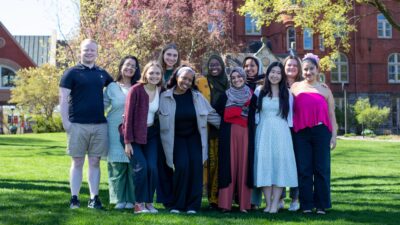
“I knew that it’s an experience that’s meant to push the undergraduate beyond what is traditionally expected of them, beyond a traditional intern experience.”
—Jared Jageler
Even before he applied to Macalester, Jared Jageler ’22 (Barrington, Rhode Island) says he knew about the Chuck Green Fellowship.
Green, who taught political science at Macalester for over 40 years, was a pioneer of civic engagement. He believed that liberal arts students with their broad set of skills were uniquely positioned to help social change organizations tackle big problems. When Green retired, former students decided to honor him by endowing a unique, “Chuck-style” fellowship, open to juniors and sophomores in good standing, in all majors.
Jageler, an economics major, applied as soon as he could and was one of 12 students selected for the six-month fellowship in 2020. “I knew that it’s an experience that’s meant to push the undergraduate beyond what is traditionally expected of them, beyond a traditional intern experience,” says Jageler.
Political science professor Paul Dosh serves as the fellowship’s facilitating professor this year. He says the program’s core is twofold. First, the fellows co-create a semester-long spring seminar, studying democratic engagement in social and organizational change in the classroom and on field trips, and developing close bonds with each other. Next, each fellow researches and chooses a community client working on an issue that is part of the local urban political landscape.
“It’s considered more like a salaried position where they do what the job takes.”
Supplemented by a $5,000 stipend, fellows work with their clients for 10 weeks during the summer to put their ideas into action and implement a solution. Throughout the experience, they stay in close contact with each other for advice and support. “When students approach the organizations, they’re saying not only am I fully available to work full-time paid, I also have this cohort of 11 other fellows backing me up, advising me, holding me accountable,” says Dosh. “It’s considered more like a salaried position where they do what the job takes.”
The cohort’s bonds were tested, and further strengthened, with the COVID-19 outbreak, and the announcement that the college would go to remote learning on March 30. Many students returned home to finish the semester. “We began preparing for distance learning before spring break,” says Dosh, “as well as preparing for the possibility of Chuck Green projects happening in 12 different cities. The cohort, he says, has stayed in close virtual contact via group Zoom meetings, working on a new syllabus, and exploring cohort activities oriented toward crisis response and community support. As the crisis unfolds, they will do their best to adapt, perhaps by working virtually with organizations.
Jageler had planned to work on the 2020 census, partnering with HACER (Hispanic Advocacy & Community Empowerment through Research) in Minneapolis to help increase response rates for communities that are traditionally underrepresented. Now back in Rhode Island, he’s hopeful that he may still be able to do census work, or perhaps switch gears.
Projects range from mental health to solar gardens
Since 2006, more than 170 Macalester students have been selected for fellowships from the Chuck Green Endowed Fund for Civic Engagement. They have worked on many issues including ending police brutality, creating college prep programs for under-served students, developing culturally specific mental health programs, shaping local food systems, installing community solar gardens, and assisting with refugee resettlement.
While many other colleges have paid summer internship programs, Dosh is unaware of any colleges that offer a six-month cohort. Facilitating the class, “keeps me on my toes,” he says. “It challenges my own thinking about my own involvement in the community.”
“The amount of small organizations here is really amazing and makes the opportunities for projects like this almost overwhelming because there are so many people to reach out to.”
—Jared Jageler
“I didn’t know about the Twin Cities before I came to Mac,” says Jageler. “We have an incredibly strong and diverse nonprofit and charitable sector…the amount of small organizations here is really amazing and makes the opportunities for projects like this almost overwhelming because there are so many people to reach out to.”
See the full list of Chuck Green Fellows.
April 3 2020
Back to top




